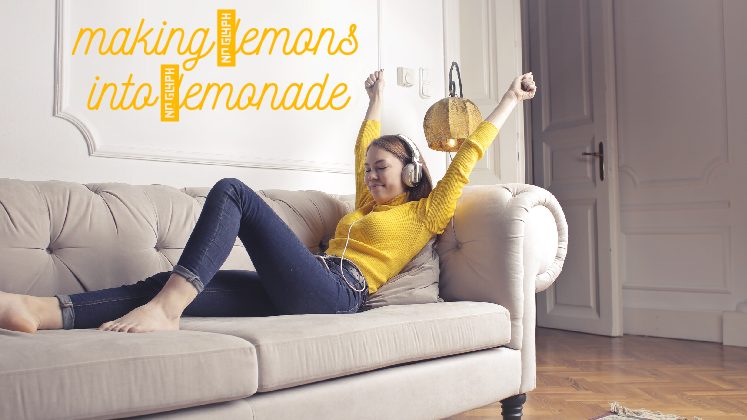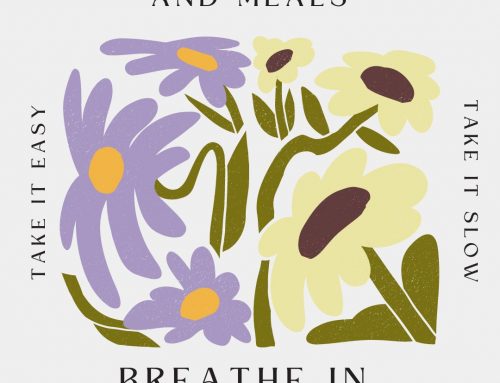Shall we make lemons into lemonade as we reframe our thoughts? Determined by the date you read this, it’s well past day 40 (or more) of our shared “new normal” lifestyle. Depending on the specific person, it can take an average of 66 days (or as little as 18 days) before a new behavior becomes a habit for most people. What seems strange at first, repeated over time, will become second nature. Our collective new behavior–social distancing, which ranges from not shaking hands or hugging friends all the way to self-quarantine–has fundamentally changed the way we live our lives, and our expectations of how our days should unfold. And while our behavior might be changing to follow current conditions, our emotional selves may still struggle going forward.
It’s no newsflash to point out that many of us are feeling somewhat out of sorts the past few weeks, to put it mildly. It is not uncommon these days to go through different waves of emotions… from mild concern to out-and-out worry over health and wellness perils… from resignation to sorrow to anger when reading or watching the news. These are trying times, to be sure. Not the times we might have asked for, but these are the times we’ve got.
The question is, what to do about it? We are creatures of habit, and so programmed to yearn for what we are used to: the daily structures that dictated our lives for years, and in some cases, decades. So we are bound to feel some sense of loss. There is no shame in wanting to roll up in a ball and hide in front of Netflix, but even that gets tiresome after a while. It turns out that just checking out from life is simply not a sustainable lifestyle strategy, even under these circumstances. I’ve been giving this a lot of thought. How does one make the proverbial lemons into lemonade when the lemons themselves seem so bitter?
One lemon at a time, of course.
Without minimizing the terrible toll this pandemic is taking on both lives and livelihoods, there may be some upsides if we dig deep enough. We don’t have to like a situation in order to get benefits out of it. One could argue, I think, that mindfulness suggests that even when we are stuck in the most unpleasant of experiences, an aware person looking for a gem buried in a sea of mud will find one. it’s a matter of where we put our focus. Not that it is easy, but it is that simple.
A consequence of social distancing can be feelings of isolation; there can be additional pitfalls related to isolation. Some people struggling with eating disorders may find that struggle even more challenging while feeling buried in isolation. The remedy to social distancing downsides is pretty simple: picking up the phone or having a video chat can help open one’s world… and just as important, one’s heart as well!
Many people are dealing with feelings of disconnection and anxiety. Disconnection from the larger world, and also disconnection from themselves. It can feel like a sort of murky mindlessness, which in itself holds a clue to how to move into a more positive space. Because it is mindfulness that encourages the sort of mental and emotional flexibility that it takes to navigate these rough waters.
For example, many people are using moments of social detachment to their advantage. They frame their isolation as something like a retreat, an enforced manner to carve away some quiet time for self-reflection. They may take the time to go gently inward, practicing meditation or relaxation exercises. They might explore ways to use their creativity that they previously did not have time to develop, by writing or in the visual arts. Used with intention, any of these approaches can be ways to reduce stress and cortisol level spikes that accompany stress.
Another way to alleviate stress and negative thinking is to focus on what actually is, not what might go wrong at some later time. Life is filled with risks, but for the most part we don’t dwell on the potential for ordinary things to go catastrophically wrong. (If we did, we’d never get out of bed each day!) Anything new and unusual carries with it an inherent element of fear; such as taking classes in a new school, or starting a new job. It is focusing on other tangible elements–such as tasks or assignments–that keeps us from falling into fear and despair.
Imagination–whether we come up with the ideas, or find them on the web in blogs like this one–is a very useful coping tool. For instance, I know one woman who shakes up her home-bound family’s routine by having theme dinners with her kids. I don’t mean she makes fancy gourmet meals, I mean she puts together the same dinners she usually makes, but adds copious amounts of pretend to the mix. One night they might make hats and put on silly accents, the next they pretend to be pirates, or dress up as Harry Potter characters.
No matter our attitude, this challenging period will pass. When all is said and done–whether our lasting lifestyle changes are minor or extensive–what really counts is keeping in mind that we can shrink or we can thrive… it is up to each of us, based on where we put our focus.
Be well, everyone.





